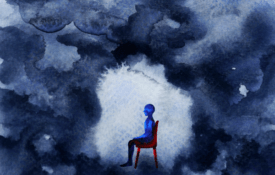-
R. Allen Gardner, 91, Dies; Taught Sign Language to a Chimp Named Washoe
Washoe was 10 months old when her foster parents began teaching her to talk, and five months later they were already trumpeting her success. Not only had she learned words; she could also string them together, creating expressions like “water birds” when she saw a pair of swans and “open flower” to gain admittance to a garden. Washoe was a chimpanzee. She had been born in West Africa, probably orphaned when her mother was killed, sold to a dealer, flown to the United States for use of testing by the Air Force and adopted by R. Allen Gardner and his wife, Beatrix. She was raised as if she were a human child. She craved oatmeal with onions and pumpkin pudding.
-

Psychological Interventions for the Treatment of Chronic Pain in Adults
In the latest PSPI, a team of researchers explores how psychological interventions can be part of a comprehensive plan to manage chronic pain while reducing the need for surgeries and potentially dangerous medications. Charles Blue interviews Mary Driscoll, a researcher at Yale University, and first author on the issue’s main article.
-

Chronic Pain Treatment Should Include Psychological Interventions
The latest PSPI examines psychological interventions for the treatment of chronic pain, including the gap between the evidence of the effectiveness of several psychological interventions and their availability and use in treatment.
-
Why Covid Has Broken Parents’ Sense of Risk
There was a brief, shining moment in early summer when the decisions around Covid and my family felt manageable. My husband and I were vaccinated and had returned to some of our favorite indoor activities, like stand-up comedy shows and the gym. Our kids were at a mostly outdoor day camp with procedures we trusted, and the local case rate was low. But as July bled into August, and the threat of the Delta variant increased and news about breakthrough infections emerged, my understanding of the risk of a given activity for any of us — but especially my 8- and 5-year-olds, who are too young to be vaccinated — went completely haywire.
-
Daniel Kahneman: How Companies Can Improve Their Hiring Process
As a young lieutenant, Daniel Kahneman was asked to improve the Israeli army’s haphazard process of assessing capabilities among combat-eligible recruits. Armed with a psychology degree and infantry experience, he brashly made up some criteria, developed questions to elicit relevant facts, and insisted interviewers ask only what he specified. Each recruit would be given a score on each criterion, and the overall “Kahneman score” would be used in deciding how demanding a role was suitable. His structured system worked. In the decades ahead, he reports, the army determined that the system really did result in better assignments.
-

Reminders of Years Left, Not Lived, Motivate Older People
For successful messaging to older adults, ditch the stereotypes, consider their future time horizons, and help them savor the moments they can enjoy.

